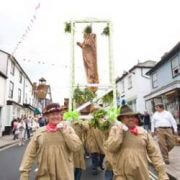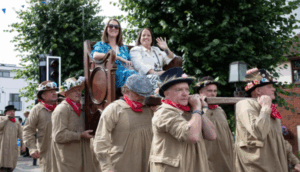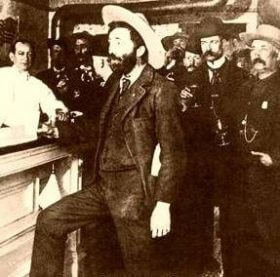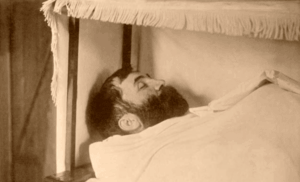Leap Year Only Flitch Day
July 9, 2025: Flitch Day awards a side of bacon to a couple still in love after a year and a day of marriage. It is only celebrated every leap year, so the next one will take place in 2028. Here’s the post for last year, which was a momentous occasion.

Flitch bearers, 2016
July 9, 2024: Today is Flitch Day, a custom dating back to 1104 in a village in Essex, England.
First, a little background is in order. A flitch is half a pig, cut lengthwise, salted and cured, also known as a full side of bacon. The story goes that a year and a day after their nuptials, Lord Reginald Fitzwater and his wife disguised themselves as peasants and traveled to the local monastery to beg blessings for their happy marriage.
The monk who received them was so impressed by their devotion that he gave them a flitch. In what could be called the first episode of Undercover Boss, Lord Fitzwater revealed his identity and promised his land to the monastery. He had one condition: the monks must award a flitch to any couple who could prove their love after a year and a day. (Who better to judge marital bliss than men who’ve taken a vow of chastity?)
The word of the tradition, known as the Dunmow Flitch Trials, spread. Author William Langland referred to it in his 1362 book, The Vision of Piers Plowman. In the early 15th century, Geoffrey Chaucer alluded to it in The Canterbury Tales.
Records weren’t kept until 1445, when Richard Wright of Norwich was victorious, according to documents preserved in the British Museum. One hundred years later, King Henry VIII closed the monasteries, but the trials endured, overseen by the current Lord of the Manor.
In 1832, George Wade, Steward of Little Dunmow, declared the contest “an idle custom bringing people of indifferent character into the neighborhood.” The Dunmow Flitch Trials declined in popularity and eventually lapsed entirely.
The custom was revived following the success of Harrison Ainsworth’s novel, The Flitch or The Custom of Dunmow, published in 1854. In it, he told the tale of a man so desperate to win the flitch that he married a succession of wives to find his perfect match.

Dunmow Flitch Trial winners, 2024
The event has been held in Great Dunmow ever since. After World War II, it was decided that the trials would only take place in leap years. Luckily, 2024 is such a year. This year’s celebration is especially important because Emma Hynds and Emma D’Costa, who have been married for under two years, have become the first same-sex couple to win the flitch. The rest of us have four more years to perfect our marriages. Or we could just buy a side of bacon and call it a day.
Did the phrase “bring home the bacon” originate with this contest? Though many believe so, we may never be certain. By the way, losers aren’t sent home empty-handed. They receive a consolation prize of gammon, the hind leg of a pig. The one thing we know for sure is that this is no fun for the pigs.
Happy Flitch Day!




 Today is Monday Holiday Law Day. Call it the mother of all holidays about holidays, and Lyndon B. Johnson the father of the long weekend.
Today is Monday Holiday Law Day. Call it the mother of all holidays about holidays, and Lyndon B. Johnson the father of the long weekend.